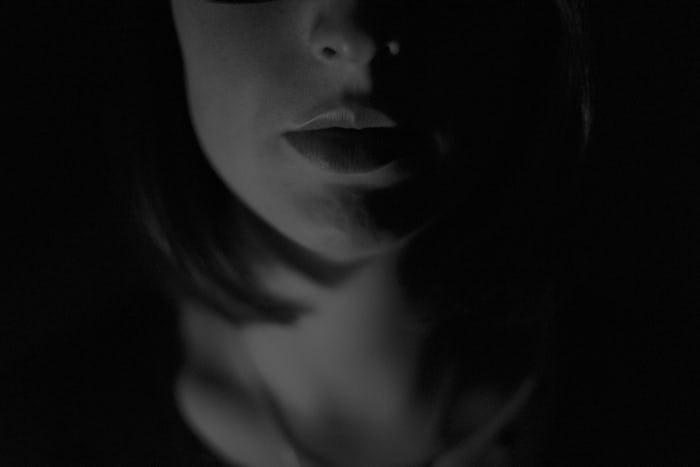The moment I walked through the door with my newborn daughter, I started to feel the tiniest sense of sadness. I was sad for my almost 3-year-old son and his potential feelings of being replaced. I was sad for my daughter who would never know what it feels like to be the only baby in the house. I was sad for myself, for reasons I couldn't (and still don't) understand. I was sad, but didn't tell anyone. It truly didn't occur to me at the time that was feeling one of the early signs of postpartum depression or PPD.
Postpartum depression is a severe, long-lasting form of depression that comes as a result of giving birth, according to the experts at the Mayo Clinic. The Centers For Disease Control and Prevention (CDC) estimated that one in nine women experience depression before, during, or after their pregnancy. Additionally, the Illinois Department of Public Health, suggested that the number of women could be even greater. As many as 20 percent of new moms are believed to experience postpartum depression.
Because the issue is so prevalent, it is more important than ever for new moms to recognize the following early signs of postpartum depression.
1
You Experience Unexplained Sadness
From the outside everything looks great. Your baby is healthy, your spouse is pitching in, you're even fitting into your favorite jeans again, so why is your heart so sad? According to the Mayo Clinic some of the earliest signs of of PPD are feelings of unexplained sadness and crying.
Sadness and crying are also symptoms of the "baby blues" which typically gets better after a few days. Often moms brush off these symptoms for far too long thinking it will just eventually go away. Most PPD symptoms will not get better until you seek treatment. It's never too early to let your doctor know about your feelings of sadness.
2
You're Scared and Don't Know Why
Every single mother fears that something will happen to her child. But moms with PPD often have an extreme sense of worry about the safety of their children. The UNC School of Medicine's Center For Women's Mood Disorders noted that one of the earliest signs of PPD is strong anxiety, tension, or fear about your child that you can't shake off. The Mayo Clinic also warned that many moms with PPD have the fear that they're not good mothers.
Much of this worry begins as a result of the hormonal shift that happens after childbirth. “Estrogen and progesterone levels increase 10- to 100-fold during pregnancy, then fall to essentially zero within 24 hours of delivery," Elizabeth Fitelson, director of the Women's Program at the Columbia University Department of Psychiatry told Parents magazine.
3
You Struggle To Sleep
You just brought home a baby. Of course you're going to have problems sleeping. But if you notice that when you do get a chance to sleep, you can't, you may have insomnia, a dangerous symptom of PPD. Postpartum Progress noted a study published in the Journal of Obstetric, Gynecologic, & Neonatal Nursing which found that depression symptoms worsen in PPD patients when their quality of sleep declines. Moms who suffer with insomnia can have difficulty caring for their infants as their concentration and good judgement declines.
Some moms have the opposite problem, they have a hard time waking up and going about their daily tasks. According to WebMD, some mothers who suffer from postpartum depression sleep too much. Sleeping too much can make it hard to care for and bond with your baby.
4
You Withdraw From Others
You might think you are spending less time with friends and family because being a new mom is taking up a lot of your time and energy, and that may be true. But the Mayo Clinic warned that actively withdrawing from your loved ones can be an early sign of depression in new moms.
5
Your Appetite Changes
Changes in your appetite – you're eating too much or not eating enough – can be symptom of depression according to WebMD. It's important to talk to your doctor about significant appetite changes. Not only can it mean you have PPD, not maintaining adequate nutrition can be doubly harmful to your body if you are breastfeeding.
6
You're Tired
It's nearly impossible to find a new mother who isn't fatigued, however Postpartum Progress noted that there's a difference between the normal fatigue that comes from interrupted sleep and the kind of deep fatigue associated with PPD that is not alleviated with rest. If you are able to get six or more hours of sleep and you still feel extremely worn down, call your doctor.
7
You Experience Brain Fog
It's easy to dismiss brain fog as "mommy brain" but Postpartum Progress warned that moms who have PPD can start to have a hard time remembering things, thinking of the right words, and multitasking. When you have brain fog, your head is cloudy and this can put you and your baby at risk while driving, cooking, or even going out for a walk.
8
You Feel Guilty
A mom who doesn't have PPD will take her early parenting mistakes in stride and realize that she's doing the very best that she can. Moms who are struggling with PPD will have an overwhelming amount of guilt and feel that their babies deserve better mothers, according to Postpartum Progress. A mom who has depression will often believe that if she isn't the perfect mom, then she is the worst mom.
9
You Have Suicidal Thoughts
This is one of the most concerning PPD symptoms a new mom can have. In fact, according to Postpartum Progress, the Edinburgh Postnatal Depression Scale requires immediate referral to counseling for any mom who answers "yes" to the question that asks, "The thought of harming myself has occurred to me". Don't brush it off, even if you think it's just fleeting thought.
